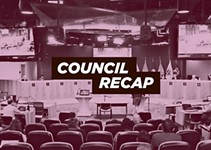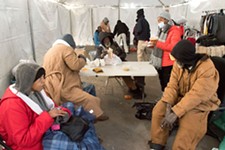Council Recap: New 4 U In 2022, It’s VMU2
City Hall dives into reworking its housing bonus programs
By Austin Sanders, 6:01PM, Fri. Nov. 19, 2021
City Council worked through a relatively light agenda Thursday, Nov. 18, with the most controversial item – re-establishing a City Marshal office to provide security at Municipal Court – postponed to Jan. 27.
Justice advocates applauded Council’s decision to defer the reincarnation of the City Marshal, a stand-alone force that reported to the city’s Law Department before it was dissolved and merged with the Austin Police Department in 2008. They remained skeptical, however, that members of the City-Community Reimagining Public Safety Task Force could be engaged in a meaningful way (especially over the holidays) on the proposal. Municipal Court Clerk Mary Jane Grubb told the Chronicle this week she intends to get “stakeholder input to create a model Marshal Office” over the 18 months it will take to establish the force, but she needs Council’s go-ahead to get that process started.
The rest of Council’s day was highlighted by land use items, including creating a new Vertical Mixed Use 2 zoning category. The provision, which passed unanimously, is intended to address what developers, urbanist planners, and housing advocates view as a glaring flaw in the existing VMU overlay, created in 2007. The idea behind that code amendment, which took three years to develop, was to allow more density and height on the city’s core transit corridors, with multifamily housing over street-level office and retail space.
While this kind of development is a standard building block for cities, both traditionally and as a default form for modern infill, it was more or less impossible to build under Austin's Land Development Code that was adopted years before this reporter was born and still hasn't been revised or replaced after nearly a decade of trying. Small area plans and custom zoning at Mueller, the Triangle, the Domain, and in West Campus helped prove the concept; the VMU overlay aimed to allow developers citywide the same benefits, such as reduced parking minimums and building setbacks. In return, those developers must provide on-site affordable housing, unlike other bonus programs that allow developers to pay into the city's Housing Trust Fund instead.
The VMU overlay wasn't applied to all properties on transit corridors; neighborhoods were allowed to designate which sites (if any) would be included and what income threshold (either 60% or 80% of Austin’s median income) would apply to affordable units. Many neighborhoods balked at VMU entirely, and even those who agreed to the overlay for sites like 5350 Burnet Road - viewed as a poster child for the concept - faced widespread dissent and opposition from unhappy neighbors. The quest for neighborhood buy-in also led to VMU height being capped at 60 feet, even though other zoning categories on these same corridors allow for greater heights. As we’ve previously reported, the developers of 2700 S. Lamar sought MF-6 zoning - the highest-density multifamily category, allowing up to 90 feet - instead of the VMU overlay put in place by the Zilker Neighborhood Association; Council gave its final approval to that change Thursday.
Though MF-6 isn’t a density bonus, 2700 S. Lamar is slated to include on-site affordable housing anyway, as a way to sweeten the deal with Council. With VMU, the amount, depth, and length of affordability is agreed to by the developer and the city. Properties outside the city bonus programs instead opt for restrictive covenants with third parties (in this case, Austin Habitat for Humanity’s HomeBase) to enforce affordability terms, which makes some neighborhood stakeholders uneasy.
Enter VMU2, proposed by Council Member Ann Kitchen (whose district includes 2700 S. Lamar) and co-sponsored by CMs Leslie Pool, Alison Alter, and Kathie Tovo. VMU2 will allow for buildings up to 90 feet in height; details on other benefits it offers developers, and what affordability will be required in return, are yet to be worked out by Housing and Planning staff. On the dais, Kitchen acknowledged that VMU2 “is not going to solve all issues around affordability and it’s not intended to. It’s intended to be one piece of the many solutions we’re talking about.”
Council’s VMU2 resolution was timed to coincide with work by both city staff and the Planning Commission to analyze the effectiveness of the city’s density bonuses and suggest revisions to keep up with Austin’s housing needs. “I hope we get to the place where we’re calibrating (bonuses) on a yearly basis to ensure we’re getting the maximum number of units we can possibly get,” said Mayor Steve Adler. Staff is directed to report back to Council with potential changes to VMU and parameters for VMU 2 on Jan. 31, 2022. Before then, Council will hold a work session to explore potential solutions to Austin’s housing affordability crisis.
Got something to say? The Chronicle welcomes opinion pieces on any topic from the community. Submit yours now at austinchronicle.com/opinion.
A note to readers: Bold and uncensored, The Austin Chronicle has been Austin’s independent news source for over 40 years, expressing the community’s political and environmental concerns and supporting its active cultural scene. Now more than ever, we need your support to continue supplying Austin with independent, free press. If real news is important to you, please consider making a donation of $5, $10 or whatever you can afford, to help keep our journalism on stands.
Lina Fisher, Dec. 9, 2022
Austin Sanders, May 6, 2022
Jan. 6, 2023
Dec. 30, 2022
Austin City Council, Council Recap, City Marshal, Municipal Court, Mary Jane Grubb, Reimagining Public Safety Task Force, Vertical Mixed Use, VMU2, core transit corridor, affordable housing, 5350 Burnet Road, 2700 S. Lamar, density bonus, Steve Adler, Ann Kitchen, Land Development Code









